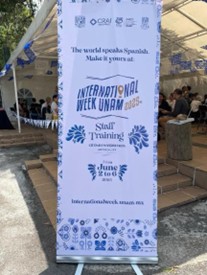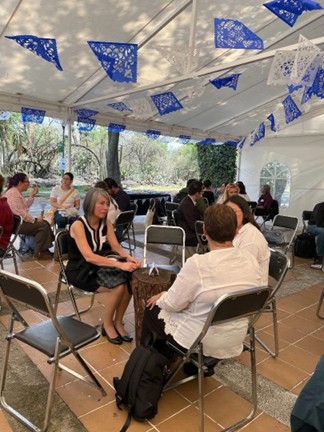Good morning, everyone.
My name is Alejandro González, and I am a faculty member at the Research Institute on the University and Education (IISUE), part of the National Autonomous University of Mexico (UNAM). I also have the privilege of serving as one of the coordinators of the Educational Policy Observatory 2024-2030. It is truly a pleasure to be here with all of you, at this International Week, and to have the opportunity to share some of the work we are doing at the Observatorio de Políticas Educativas (OPE).
The Observatory is an initiative launched by IISUE in late 2024, with a clear purpose: create a space to inform, document and discuss educational policies. In essence, the Observatory functions as an academic platform to monitor and interpret developments in real time, and to share those insights with a broader audience – both within and beyond academia.
What are the Observatory’s goals?
Above all, it aims to analyze, systematize, and disseminate key knowledge that can contribute to the development and strengthening of the educational field. This means the Observatory does not just gather information for its own sake – it is actively transforming data and events into organized knowledge that educators, researchers, and decision-makers can use. The observatory aspires to be a central hub for the education research community, especially for those focusing on policy issues, offering them a rich repository of analyses and data. At the same time, it seeks to gradually extend its impact beyond academia, helping inform policymaking and the public with evidence-based research.
How does the Observatory operate, and what is its scope of work?
The team employs rigorous methodologies and digital tools to gather and organize relevant data on the educational system. In other words, we continuously scan the educational landscape, compiling statistics, policy documents, legislative changes, and research findings. For example, if a new law is proposed or a major reform is enacted, the observatory compiles pertinent information, analyzes potential impacts, and places it in historical and international context. This systematic approach transforms isolated data or information into a coherent picture of where Mexican education is headed.
A central feature of the OPE’s approach is its emphasis on collaboration and dialogue. The Observatory serves as an open space for plural and critical engagement with education policy, fostering exchanges among researchers, policymakers, and other stakeholders. Through public conversations and digital content, it encourages collective reflection on the challenges facing the education system. This commitment to collective knowledge-building invites everyone invested in education to contribute and benefit from this shared effort.
Let me now outline the structure of the Educational Policy Observatory, which is organized around four main components or workstreams that guide its activities:
- Conjunctural Analysis: A section that provides timely, critical insight into current events and policy shifts in Mexican education.
- Structural Analysis: Focused on long-term issues and systemic challenges, this axis supports in-depth studies on equity, governance, funding and institutional reform.
- News & Articles: A space for relevant news and expert perspectives. It gathers articles, press releases, and policy commentary from national media and specialized sources.
- Repository: A digital archive of educational policy documents, including laws, reports, research publications, and media sources.
In addition to its core areas, the Observatory emphasizes training and capacity-building as a cross-cutting goal. Over time, this will include activities such as seminars and courses aimed at students, early-career researchers, and practitioners. As Gabriela de la Cruz, Director of IISUE, remarked at the launch, what excites the team most is the chance to “reflect and propose theoretical, conceptual, and methodological mechanisms” — and to train others, from students to decision-makers, in these tools. In the long term, this educational mission may be one of the Observatory’s most lasting contributions.
Since its official launch, the Observatory has already begun to make meaningful contributions by organizing public conversations on some of the most pressing issues in Mexican education policy. In parallel, the Observatory has begun producing written content on emerging policy issues. These early efforts reflect a strong commitment to timely, responsive engagement. All materials are made available through the Observatory’s website, as part of a deliberate strategy to ensure open access to evidence-based analysis for both national and international audiences.
This brings me to my final point: the broader significance and opportunities for international collaboration that the Educational Policy Observatory embodies. While the Observatory is rooted in the Mexican educational context, its approach and vision have much to offer globally. The period it covers aligns with the timeline of the UNESCO Education 2030 Agenda and the Sustainable Development Goals, particularly the goal of quality education (SDG 4). By closely tracking Mexico’s progress, policies, and innovations in education over these crucial years, the OPE can generate insights that resonate with challenges faced in many countries: issues like improving equity and inclusion, raising educational quality, training teachers, and balancing innovation with tradition in curricula.
There is a growing international acknowledgement that policy observatories and evidence hubs are valuable in driving informed educational reforms and OPE is part of this emerging global ecosystem of knowledge-sharing. We anticipate that OPE’s findings and methods can trigger academic exchanges beyond our borders. For example, a study on digital inclusion in Mexican schools might interest colleagues working on similar projects in other Latin American countries, or an analysis of teacher professional development policy could be compared with experiences in Asia, Europe or the US. By inviting international scholars to access our repository, read our analyses, and even contribute or collaborate on research, the Observatory aims to break out of any national silo. Education is a global endeavor, and many policy lessons are transferable. In this sense, OPE aspires to becoming a node for international collaboration in educational research and policy analysis. We warmly welcome partnerships – whether it’s joint webinars, comparative studies, or exchanges of data and ideas. Through such collaborations, the Observatory can both learn from and contribute to the worldwide community striving to improve education.
To conclude, the Educational Policy Observatory 2024-2030 is a forward-looking, dynamic project that embodies an important bridge between academic research and educational policymaking. It provides a structured yet flexible framework to capture the beat of educational change in Mexico, from day-to-day policy shifts to long-term structural transformations. At the same time, it fosters a community of experts and learners who together engage in critical reflection and knowledge creation. The Observatory’s goals, scope, and structure all serve one overarching mission: to strengthen education through informed dialogue and evidence-based understanding. Its contributions – in the form of analyses, resources, and capacity-building – are already helping to clarify complex issues and guide decision-making. And looking outward, its spirit of openness and scholarly rigor make it a valuable partner in international efforts to share best practices and learn from each other’s policy journeys. We are excited about what the coming years hold for this initiative, as it grows and adapts alongside the fast-changing landscape of education. I invite all of you, as part of an international audience of university staff and researchers, to engage with the Observatory – explore its findings, offer your perspectives, and consider collaborative ventures. Together, through such knowledge exchanges, we can contribute to better educational policies not only in Mexico but around the world.
Thank you very much for your attention, and I am happy to discuss further or answer any questions about the Educational Policy Observatory and its work.




